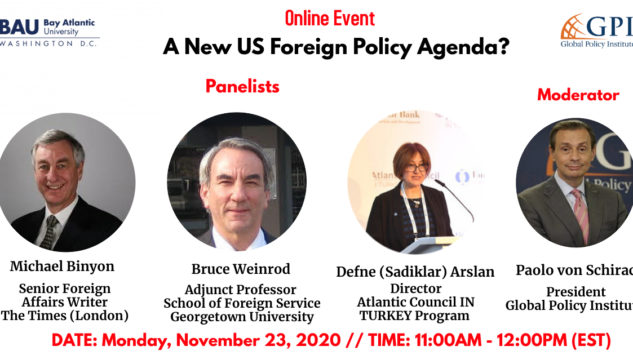Events

On November 23 The Global Policy Institute and Bay Atlantic University held a webinar titled:
A New US Foreign Policy Agenda?
Panelists
Defne (Sadiklar) Arslan, Director, The Atlantic Council IN TURKEY Program
Bruce Weinrod, Adjunct Professor School of Foreign Service, Georgetown University
Michael Binyon, Senior Foreign Affairs Writer, The Times, London
Moderator
Paolo von Schirach, GPI President, and Chair of Political Science and International Relations at Bay Atlantic University
Looking at the impact of a Biden presidency on US Turkish relations, Arslan noted that the forecast about likely deteriorations may be incorrect. Looking at the broad context, relations were not great with Trump as President. Going forward, there is hope in Turkey that Biden and his foreign policy team will be more predictable. Steady leadership on NATO issues. No surprises. From a British standpoint, Binyon noted that the number one concern in London will be the negotiation of a UK-USA free trade agreement once Great Britain leaves the European Union at the end of the year. Overall, he noted that there is a sense of relief in the UK, and more broadly in Europe, when looking at the prospect of returning to “normal” under a more predictable Biden presidency.
Weinrod pointed out that we are now in a very uncertain global environment. We are done with post-post-Cold War world. We are reverting to a balance of power logic. At the same time, there is instability caused by at least 22 ongoing conflicts. The cherished postwar “rules based international world order” is not working any more. Challenges for the US include Russia, China, and Iran. Coming to Turkey and NATO relations, Arslan pointed out that there may be a way to resolve the S 400 controversy in a pragmatic way. At a different level, Turkey will be looking at new developments in the Middle East after the establishment of diplomatic relations between Israel and two Gulf countries that has taken place recently under the auspices of President Trump. Binyon argued that, as French President Macron stated in a widely circulated interview, NATO is not doing well. It does not have a clear purpose, while it lacks adequate military resources. Recreating cohesion and redefining its mission should be a priority going forward.
Weinrod argued that NATO is still relevant. Certainly, substantial, and uncoordinated defense spending cuts after the end of the Cold War did not help. Still, the Atlantic Alliance continues to be the best institution for continuing cooperation among key Western countries on a range of security and political issues. Overall, under President Trump something has improved. Defense spending is up in Europe. Neutral Sweden is trying to increase security coordination with its neighbors –all members of NATO. The Afghanistan NATO mission proved that NATO countries can work together far away from Europe. Binyon pointed out that the challenge going forward will be for democracies to find ways to cooperate more effectively. The challenges are now way beyond the classic one of invoking collective self-defense in case of an armed attack. There are nonmilitary but equally dangerous threats ranging from cyber-attacks to efforts at creating political chaos in Western countries. Arslan reiterated that NATO must define its future mission, so that all members states can rally and provide the resources to accomplish shared goals. Pragmatic approaches and incremental steps are in order.
Regarding Iran, Weinrod noted that we shall have to wait and see if a Biden administration will try to completely reverse Trump’s maximum pressure approach. Not clear that Biden will immediately lift or suspend all the sanctions. Is the end game restoring the entire Nuclear Deal, or try something different?